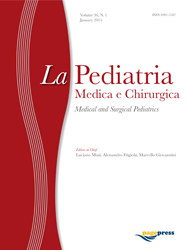Reviews
Vol. 39 No. 2 (2017)
Nutritional and metabolic programming during the first thousand days of life

Publisher's note
All claims expressed in this article are solely those of the authors and do not necessarily represent those of their affiliated organizations, or those of the publisher, the editors and the reviewers. Any product that may be evaluated in this article or claim that may be made by its manufacturer is not guaranteed or endorsed by the publisher.
All claims expressed in this article are solely those of the authors and do not necessarily represent those of their affiliated organizations, or those of the publisher, the editors and the reviewers. Any product that may be evaluated in this article or claim that may be made by its manufacturer is not guaranteed or endorsed by the publisher.
Received: 7 June 2017
Accepted: 26 June 2017
Accepted: 26 June 2017
16037
Views
7318
Downloads
1609
HTML






